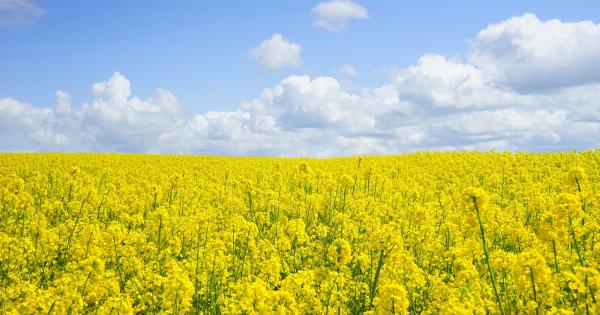As the chill of winter fades away and the days start to get longer, there is a sense of rejuvenation and new beginnings in the air. Spring, with its vibrant colors and blooming flowers, is a time of transformation and awakening.
However, for many people, spring also brings along an invisible menace – pollen. While pollen may seem harmless to some, it can wreak havoc on the lives of those who suffer from seasonal allergies. In this article, we will explore the unseen dangers of pollen and how it can impact our health and wellbeing.
Understanding Pollen
Pollen is a fine powder produced by plants as part of their reproductive process. It consists of microscopic grains that contain male reproductive cells of flowering plants, such as trees, grasses, and weeds.
Pollen grains are incredibly lightweight, allowing them to be dispersed by the wind or insects to reach the female reproductive parts of other plants, thus enabling pollination.
Types of Pollen
There are various types of pollen that become prevalent during different times of the year. In spring, tree pollen is the most common culprit causing allergies. Trees like oak, cedar, birch, and pine release massive amounts of pollen into the air.
Grass pollen is another major allergen during late spring and summer. Ragweed pollen, which is released in late summer and early fall, is also notorious for triggering allergies.
Allergic Reactions to Pollen
For those with allergies, exposure to pollen can lead to a range of symptoms. Some common allergic reactions to pollen include:.
Sneezing and Runny Nose: The immune system, upon coming into contact with pollen grains, releases histamines. Histamines cause the blood vessels in the nose and eyes to dilate, resulting in sneezing and a runny nose.
Itchy and Watery Eyes: Pollen can cause the eyes to become red, itchy, and watery. This allergic reaction is known as allergic conjunctivitis.
Scratchy Throat and Coughing: The throat may become irritated and itchy, leading to a persistent cough.
Wheezing and Shortness of Breath: In some cases, pollen can trigger asthma symptoms, such as wheezing and difficulty breathing. This is particularly true for individuals who already have asthma.
Headache: Pollen allergies can also cause headaches and sinus pressure, leading to discomfort and reduced productivity.
Impact on Daily Life
Seasonal allergies can significantly impact an individual’s quality of life. The symptoms can range from mild to severe and may persist for weeks or even months.
Allergic reactions to pollen can make it difficult to concentrate, affect sleep patterns, and decrease overall productivity. Additionally, the constant discomfort and fatigue caused by allergies can take a toll on mental health and lead to irritability or feelings of frustration.
Furthermore, individuals with severe allergies may develop a condition called allergic rhinitis, which is characterized by chronic inflammation of the nasal passages.
This condition can affect the sense of smell and taste, making it harder to enjoy food and fully experience the pleasures of life.
Managing Pollen Allergies
While completely avoiding pollen may be challenging, there are several measures individuals can take to minimize exposure and manage their allergies effectively:.
Monitor Pollen Levels: Keeping an eye on daily pollen counts can help individuals plan their outdoor activities accordingly. Pollen counts are typically higher during mid-morning and early evening.
On windy days, pollen is more likely to be present in the air.
Keep Doors and Windows Closed: To prevent pollen from entering the house, it is advisable to keep doors and windows closed, especially on high pollen days.
Use Air Purifiers: Air purifiers equipped with HEPA (high-efficiency particulate air) filters can help eliminate pollen particles from indoor air, reducing exposure and symptoms.
Wear Protective Clothing: When spending time outdoors, wearing sunglasses and hats can help protect the eyes and hair from pollen. Additionally, wearing a mask can be beneficial in reducing inhalation of pollen particles.
Shower and Change Clothes: After spending time outdoors, it is important to shower and change clothes to remove any pollen that may have attached to the body or clothing.
Medications and Allergy Shots: Over-the-counter antihistamines, nasal sprays, and eye drops can provide temporary relief from allergy symptoms.
In severe cases, allergy shots, also known as immunotherapy, can help desensitize the immune system to specific allergens, including pollen.
Looking Towards the Future
Pollen allergies affect millions of people around the world, and the number of individuals suffering from these allergies is on the rise. Climate change is thought to be a contributing factor to the increased prevalence and intensity of allergies.
Rising temperatures and higher carbon dioxide levels can lead to extended pollen seasons and greater pollen production. Additionally, changes in rainfall patterns can affect the distribution and concentration of pollen in different areas.
Researchers and scientists are working towards developing new strategies to combat the challenges posed by pollen allergies.
This includes exploring the potential of genetically modifying plants to reduce their pollen production or altering the composition of the pollen to make it less allergenic. Other approaches involve the development of advanced allergy medications and improved diagnostic techniques to better understand the individual’s immune response to pollen.
By gaining a better understanding of pollen and its impact on human health, we can pave the way for a future where allergies are effectively managed, and individuals can fully enjoy the wonders of spring without the fear of allergic reactions.
In Conclusion
While pollen may seem invisible to the naked eye, its effects on individuals with allergies are impossible to ignore.
Seasonal allergies caused by pollen can have a significant impact on an individual’s daily life, well-being, and overall enjoyment of spring. By being aware of pollen levels, taking preventive measures, and seeking appropriate medical assistance, individuals with allergies can minimize their exposure and manage their symptoms effectively.
With ongoing research and advancements in allergy management, the future holds hope for those affected by pollen allergies. So, as the spring flowers bloom, let us also strive to bloom with good health and vitality, free from the unseen dangers of pollen.































